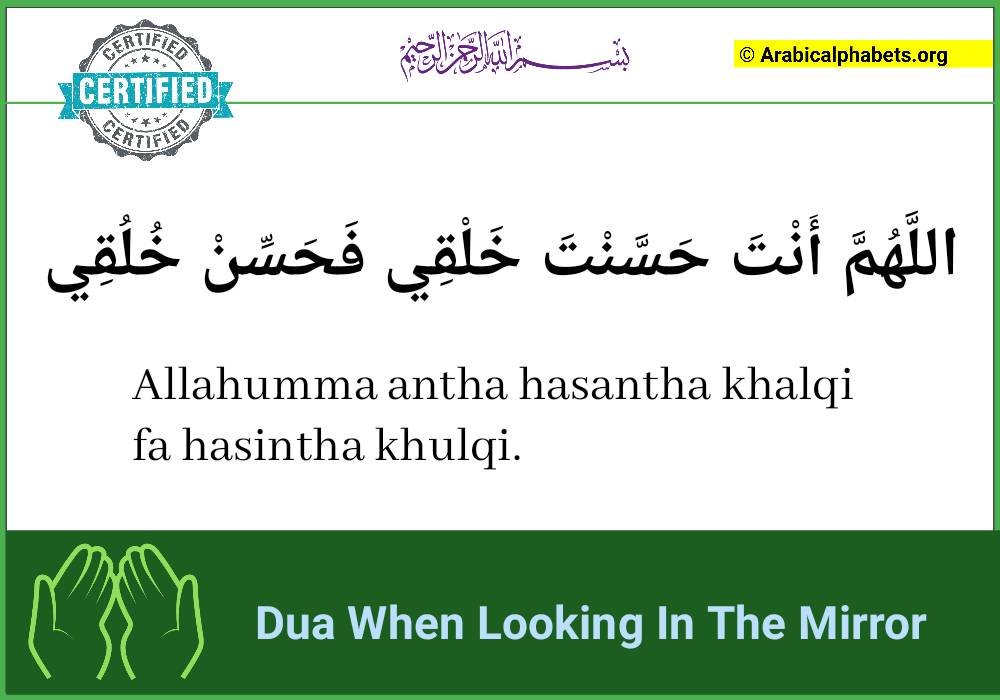Dua When Looking In The Mirror Arabic & English Text
Are you looking to improve your Arabic? Arabicalphabets.org is the perfect site for you! We provide accurate Islamic content and Dua when looking in the mirror in both Arabic and English.
With our help, you can improve your language skills quickly and easily. In the Name of Allah, the Most Merciful and Compassionate.
When we look in the mirror, what do we see? Our reflection stared back at us, perhaps with a critical eye or a loving gaze. But have we ever paused to consider the deeper significance of this act? In many cultures, mirrors hold symbolic meaning beyond their practical purpose.
They are believed to be portals connecting our physical selves with the spiritual realm. In Islam, looking in the mirror is an opportunity to connect with Allah through dua (supplication). Join us as we explore the power of dua when gazing into the mirror, delving into both Arabic and English texts to uncover the wisdom and blessings within these ancient prayers.
Dua When Looking In The Mirror
|
One of the things that Muslims are supposed to do every day is look in the mirror and recite a dua. This dua is called the Dua When Looking In The Mirror.
The Dua When Looking In The Mirror is very important because it helps us remember our life purpose: worship Allah.
The Dua When Looking In The Mirror is recited in Arabic and English.
When you look in the mirror, what do you see? Do you see a beautiful person who is loved and respected by all? Or do you see someone who is flawed and needs to be fixed?
Looking in the mirror can be a daunting experience. We are often our worst critics and can find fault with even the smallest details. However, it is important to remember that we are all imperfect beings, and everyone has unique beauty.
One way to appreciate your reflection is by reciting a du’a (prayer) when looking in the mirror. This data is simple yet powerful, reminding us of our worth in Allah’s (God’s) eyes.
Dua for self-love: Can Islamic teachings help us love ourselves more?
- Self-love is critical to a person’s well-being and happiness, but it can be hard to come by.
- Islamic teachings offer a path to self-love through dua or prayer.
- Dua can help us connect with Allah, which can help us love ourselves more.
Conclusion Points
My Advice: Dua learning, also known as Islamic supplication, is important to Muslim prayer. Learning correct dua phonetics from a reputable Imam will help you to recite dua for maximum outcome.
When looking at oneself in the mirror, it is important to remember the adage “dua.” This means that one should always be grateful for what they see, no matter how they view themselves.
While focusing on physical appearance and finding fault is easy, it is important to remember that everyone has unique beauty. Dua reminds us to be thankful for the faces we see each day and appreciate our attractiveness.
FAQs
Question – What are the benefits of Dua for looking in the mirror?
Answer: The practice of Dua for looking in the mirror can be seen as a powerful tool for self-reflection and introspection.
It has the potential to help individuals gain greater clarity and insight into their personal identity, beliefs, and values.
Through this process, individuals may become more aware of their current emotional state and how their behavior impacts those around them.
Question – What are the steps for Dua for looking in the mirror?
Answer: The process of Dua for looking in the mirror is an important ritualistic practice that practitioners of the Islamic faith have employed for centuries.
This procedure encompasses a sequence of preliminary stages and the utterance of particular supplications or prayers, all aimed at ensuring that the action is carried out in a spiritually favorable manner.
Firstly, one must perform wudu, or ablution, as a form of purification before beginning the ritual.
Question – What are some common Dua for looking in the mirror?
Answer: Various duas, or supplications, are employed in traditional Islamic practice when looking in the mirror.
Allahumma antha hasantha khalqi fa hasintha khulqi.
Frequently, Muslims recite a supplication (dua) to seek protection and guidance from Allah (SWT), such as: “In the name of Allah, with whose name nothing on earth or in heaven can cause harm, and He is the All-Hearing and All-Knowing.”
Question – What is Mirror dua Hadith?
Answer: Mirror dua Hadith is an Islamic religious practice that involves repeatedly reciting a specific invocation or prayer to seek Allah’s guidance, protection, and blessings.
The Mirror dua Hadith is based on a hadith (or tradition) attributed to the Prophet Muhammad, wherein he states that if one reads a certain supplication seven times in the morning and seven times in the evening, Allah will grant him whatever he wishes.
Question – When should I recite the dua when looking in the mirror?
Answer: You can recite the dua whenever you look at yourself in the mirror, whether during your daily grooming routine or simply catching a glimpse of your reflection.
Question – What is the significance of reciting this dua?
Answer: Reciting this dua reminds us to be grateful for our physical appearance and seek inner beauty and good character traits from Allah.
Question – Can I recite the dua silently, or must it be said out loud?
Answer: You can recite the dua silently or say it out loud, depending on your preference. The intention and sincerity behind recitation matter more than the volume.
Question – Is there a specific time limit for reciting this dua?
Answer: There is no specific time limit for reciting this dua. You can say it as often as you want or feel comfortable whenever you see yourself in a mirror.
Question – Can I use an alternative translation of the English version of the dua?
Answer: You can use alternative translations that convey a similar meaning if they resonate with you more personally.
Question – Does reciting this dua have any additional benefits?
Answer: In addition to promoting gratitude and self-reflection, reciting this dua can help strengthen one’s self-esteem and encourage a positive self-image.
Question – Can non-Arabic speakers still benefit from saying this dua?
Answer: Absolutely! Non-Arabic speakers can benefit from saying this powerful dua by understanding its meaning in their native language and connecting with its message.






Good information
thanks